The Changing Face of the Ocean Part 2: No More Fish
Over the last century, we've fished over 90% of all the large bony fish from our oceans. As far as fish are concerned, the oceans are now an apocalyptic wasteland. 85% of the world's fisheries are overstressed. Our overfishing habits are tearing apart oceanic ecosystems at an astonishing rate.
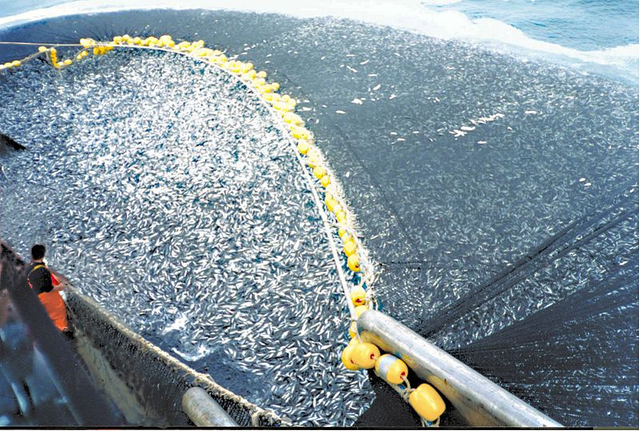
400 tons of mackerel being reeled in. [Image source]
The overfishing and ecological damage dealt to our oceans is, in great part, a direct effect of our fishing industry. For centuries now there have been strong financial incentives for fishermen to catch as many fish as humanly possible with every single trip. It's a classic tragedy of the commons style situation. Since no one owns the ocean, there's little incentive for fishermen to regiment their catch. This has led to the overexertion and collapse of fishery after fishery over the last century.
Mechanization has only increased the severity of the problem. It allowed us to take so many fish out of the ocean that we now have to work seventeen times as hard for every pound of fish we land. We've moved into new fishery after new fishery. When one oyster bed fails, we move to the next. When the Atlantic cod and salmon fisheries collapsed, we started exploiting Chilean sea bass and other deep sea fish. This is just the tip of the iceberg, too. The global fishing industry is a hugely problematic one. Deep sea dredging, possibly the most environmentally destructive fishing technique, almost always runs at a loss- they only survive on government subsidies.
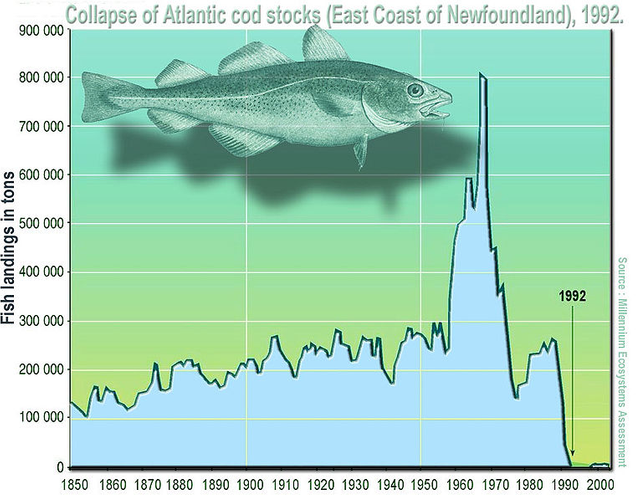
As mechanization and fishing fleet sizes increased, more and more cod were caught off of the coast of Newfoundland. The government and the fishing industry completely ignored the problem, despite the warnings of some local fishermen and marine biologists (though many scientists and local fishermen also denied the problem). Eventually, this resulted in a complete collapse of the Northwest Atlantic cod fishery in 1992, which has yet to recover even after close to three decades. [Image source]
One major problem is bycatch- unwanted fish caught along with the desired catch. Bycatch is simply thrown back into the ocean, generally. Unfortunately, most bycatch can't stand the stresses of being caught, hauled out of water, and then being kept there for potentially hours- even conservative estimates often put the bycatch mortality rate at over 90%. The worst offender is the tiger shrimp fishery, which catches many times more bycatch than shrimp.
As if this all wasn't bad enough, overfishing actually seems to be altering the course of evolution. Fishing tends to be self-selecting for larger fish. You get more meat and profit off of a large fish. When you use larger hooks that small fish can't fit in their mouths or nets with larger gaps in them that small fish can slip through, only large fish get pulled in. Over time, however, this has started artificially breeding populations of small fish, which, in turn, demands we start using techniques for smaller and smaller fish. This is known as "fishing down the food web."
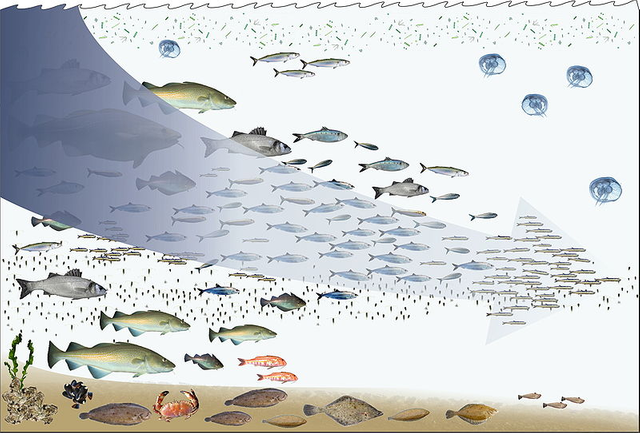
Fishing down the food web: as we overfish populations of larger fish, we're forced to start fishing for smaller and smaller species of fish. [Image source]
It's not just the size of fish that are affected, however. Unlike in mammalian species, older, larger fish tend to have the most children. As we've been breeding fish to be smaller, we've also been altering them to spawn earlier and produce fewer offspring, further threatening their populations.
Thanks to the lower populations and smaller average size of bony fish, many of their prey populations are now exploding in number, including squid and jellyfish. On the flip side, many species that preyed on these bony fish populations, including sharks and toothed whales, are now being forced to adapt to new food sources or starve. The entire oceanic ecosystem is being altered.
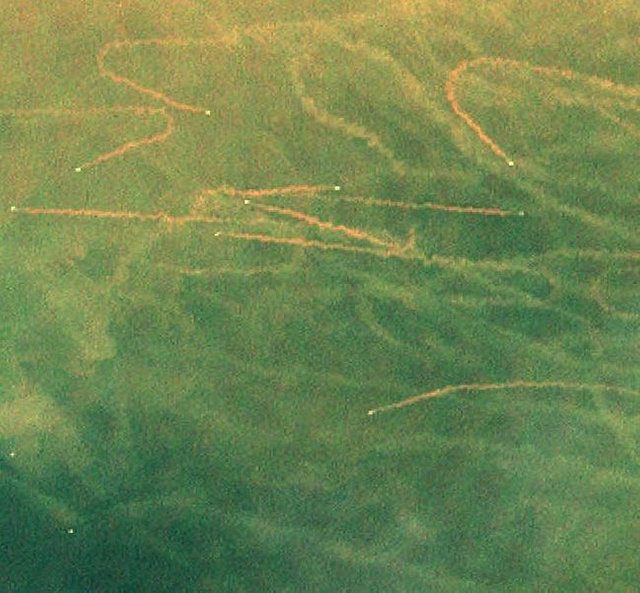
Satellite image of deep sea trawling paths. This method of fishing not only carves huge gouges in the seafloor, but also leaves immense plumes of sediment behind them. Deep sea trawling is by far the most environmentally destructive method of fishing, especially considering that the deep sea fish and corals most hurt by it grow and reproduce extremely slowly. [Image source]
There are steps that can be taken to prevent these issues from getting worse, however- and maybe make things better. First, and most importantly, we need to maintain our marine preserves and establish new ones. Marine wildlife preserves, where fishing and many other destructive activities are forbidden, act as population reservoirs. The lack of fishing allows populations to reestablish themselves, and they then spread out to unprotected areas from there. Marine preserve usage in the past has The UN currently has a goal of getting 10% of our oceans protected by 2020, which is a good start. Unfortunately, many scientists believe the number needs to be at least 20-30%. And while the goal may be 10%, we're not there yet.
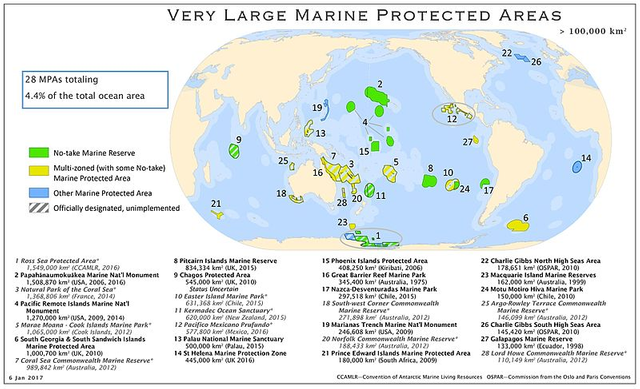
Marine protected areas. This map doesn't include smaller marine preserves, like the extensive network of smaller ones present on the American West Coast. Research does indicate, however, that a single large wildlife preserve is much, much more effective than an equal territory of smaller preserves- often many times more so. [Image source]
Marine preserves are just the first big step, however. We need to establish better fishery management- we need to better regulate what fish are caught, when, and keep to strict quotas. We need to promote fishing methods with lower bycatch. We need to promote environmentally friendly aquaculture (emphasis on environmentally friendly- some fish farming is intensely environmentally destructive). We need to remove government subsidies for environmentally destructive fishing techniques like deep sea trawling. There are a ton of methods to help over-exploited fish populations, and, somewhat surprisingly, the US has been a consistent leader in ocean conservation for a while now. Over 41% of US waters are marine preserves, largely in the Pacific, and both the Bush and Obama administrations were consistent champions of sea conservation.
There are plenty of actions individuals can take as well. The best one is supporting sustainable fisheries over exploited ones with your purchasing habits. To check whether a type of fish is sustainably fished, you should check out Monteray Bay Aquarium's Seafood Watch, which helps monitor global fisheries, along with numerous other scientific and conservationist strategies. Asking your local seafood restaurants to support sustainable fisheries is an excellent tactic as well. If you're interested in further educating yourself, I highly recommend checking out Callum Roberts' excellent book The Ocean of Life: The Fate of Man and the Sea. If you're feeling especially driven, I highly recommend donating to one of the excellent marine conservation charities out there. The Ocean Foundation and the aforementioned Monteray Bay Aquarium are both excellent options, but there are many more out there as well.
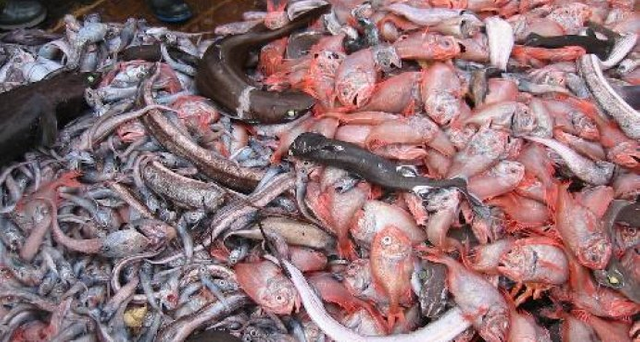
The Orange Roughy (the orange fish on the right) is often described as the single least sustainable fishery. This bottom dwelling fish tends to congregate around seamounts, and is commonly targeted by deep sea trawlers. It takes decades for a single orange roughy to reach maturity and reproduce slowly even then. They count on their extremely long lifespans- a century and a half or more- for reproductive success. Massive overfishing of the species has devastated their population. [Image source]
Bibliography:
The Ocean of Life: The Fate of Man and the Sea, by Callum Roberts
http://ourocean2016.org/marine-protected-areas/
https://blog.marine-conservation.org/2014/05/how-much-of-our-ocean-is-protected.html
http://www.un.org/sustainabledevelopment/blog/2016/12/more-than-5-per-cent-of-worlds-oceans-now-protected-with-more-commitments-underway-un-environment-wing/
https://en.wikipedia.org/wiki/Collapse_of_the_Atlantic_northwest_cod_fishery
https://en.wikipedia.org/wiki/Overfishing
https://en.wikipedia.org/wiki/Marine_protected_area
https://en.wikipedia.org/wiki/Bottom_trawling
http://ocean.si.edu/ocean-news/rough-going-orange-roughy

It is quite depressing the rate at which man rapes this planet. It was once observed that Atlantic cod population was so vast that a man could walk on their heads from England to thr New World without getting his feet wet. All the world's governments are likely aware of the depletion of Oceanic fisheries; Japan has accumulated enough frozen blue fin tuna in their "strategic reserve" to last them for 30-years, after the tuna becomes extinct. The so-called Chilean bass will be extinct in less than 10-years hence. Only if man can be convinced to eat locusts, rats, cockroaches, and bed-bugs, those will be extinct within a year without the needfor the extermination industry.
Can anyone here spell "standing reserve"? For all that I dislike Heidegger as a person, his ideas about civilization, technology, and their interaction with nature are still pretty spot on.
I prefer Campbell's formulation. Once man began shifting perception of his environment from "I-Thou" relationship to "I-It" relationship, man began to exploit nature as a resource. Man's inhumanity towards his fellow man can also be attributed to "I-It" formulation aganst those with whom man disagrees. Man has a spiritual disease, from which all of creation suffers.
Joseph Campbell? Yeah, I like that formulation a lot.
The disease is a particularly infectious one, too. I've been reading a lot about our society's interactions with Amazon tribesmen and other indigenous people lately, and it's a particularly depressing one.
This is just horrific. I always used to look for the "sustainably caught" label when buying tinned fish, but after a while almost all the tinned fish in the shops was being described as "sustainably caught". Then as a consumer you start to get lazy because you get used to it being described in this way.
After reading your post I checked one of the tins in my mum's cupboard, and the label had a circle with an illustration vaguely resembing a dolphin with the word "safe" above it. That could mean just about anything.
Yeah, you definitely need to look it up online.
Awesome post, here is an upvote! I'm so glad to see this issue brought to light in such a well researched an informative article here on Steemit. You brought up excellent points about the subsidies and by catch, both topics that are often overlooked in this discussion. Not only are there issues with over harvesting, but the significant amounts of bioaccumulation in predator fish, such as tuna, is just another testament to the sheer disregard for habitats and the environment all across the world. Thanks for the quality post.
Thanks for reading!
Wow - I was aware of the deplorable status of the oceans as far as overfishing goes, but hadn't considered it would be affecting the evolution of the fish itself even though that makes sense. Which then triggers a nasty cycle of even more overfishing.
I've thought about going completely vegetarian (right now I avoid beef/pork) but it can be an uphill battle... I'm mocked for what I do even though I'm not even a full fledged vegetarian, and it's not even by global warming deniers, it's by people who already accept the idea of a polluted, worsening planet. Sorry got a bit on a tangent there, but I do believe lower consumption of meat overall would be helpful...
The "should I go vegetarian" issue is definitely a complicated one- I should do a post on it.
As usual high quality in your post and I can't wait but think to a time when we will grow all of our food in a controlled way. Or maybe we can have the meat being artificially grown. But would we go for it? Would you eat meat grown artificially? Even if it's meat? :D
I'd absolutely eat lab grown meat- I'm planning on doing a post about that soon, actually.
Count me in!
Great post. Living here on the coast of NC can totally relate. Thanks @journeyfreedom
When there are no more fish in the ocean... then China will develop their artificial fishes .. Lol....
...Artificial fish seem somewhat improbable.
Your Post Has Been Featured on @Resteemable!
Feature any Steemit post using resteemit.com!
How It Works:
1. Take Any Steemit URL
2. Erase
https://3. Type
reGet Featured Instantly � Featured Posts are voted every 2.4hrs
Join the Curation Team Here | Vote Resteemable for Witness
Congratulations! This post has been chosen as one of the daily Whistle Stops for The STEEM Engine!
You can see your post's place along the track here: The Daily Whistle Stops, Issue # 53 (2/22/18)
The STEEM Engine is an initiative dedicated to promoting meaningful engagement across Steemit. Find out more about us and join us today!